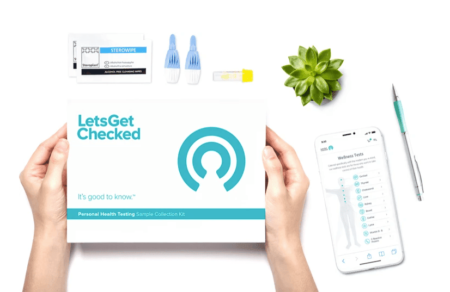Your guide to getting pregnant with IUI
Two midwives share everything you need to know about the fertility process.

Nastyaofly/Twenty20
By Marea Goodman and Ray Rachlin
There are lots of ways to make a family–including lots of different fertility processes, each with a different three-letter acronym (IVF, IUI, ICI, we’re looking at you).
While you’ve probably heard of in vitro fertilization (IVF) before, intrauterine insemination (IUI) is often tried prior to trying IVF, namely because it’s cheaper and less invasive.
Getting pregnant with IUI is the process of putting sperm directly into a person’s uterus to optimize their chances of pregnancy. Many people use IUI to get pregnant, including LGBTQ+ people, people who are single and heterosexual couples having fertility struggles. While it sounds like a complex medical procedure, IUI is actually a very simple, safe and effective option for conception.
We’ll explain everything you need to know about IUI: How it works, how successful it is, how much it costs, what it feels like and more.
What is IUI?
Intrauterine insemination (IUI) is the process of inserting a washed sperm sample directly into the top of your uterus during ovulation to maximize your chance of achieving a pregnancy. IUI can be performed with frozen, washed sperm from a sperm bank, or your provider can process fresh semen using a special wash and then use the sperm for IUI.
In heterosexual intercourse or at-home insemination, the seminal fluid is deposited close to your cervix. Then, the sperm swims up, through the cervical mucus within the cervix, up into the uterus and then into your fallopian tubes. This can be a long journey for microscopic organisms. When using IUI, the sperm get to hitch a ride all the way to the top of your uterus, so that they don’t have to travel too far to reach your fallopian tubes and your awaiting egg.
This method is ideal for people using sperm from a sperm bank or for people whose partners or sperm donors have low sperm count or motility.
How does the IUI procedure work? And what does IUI feel like?
The IUI procedure is relatively simple. You can receive an IUI at a fertility clinic, or, if the service is available in your area, at home with a midwife.
The first step in the IUI process is positioning the speculum. This can occasionally be uncomfortable for people, especially for those who have experienced past sexual or medical trauma. It’s so important to have a provider with whom you feel safe, and who explains to you what they are doing before they do it.
Once the speculum is positioned and your provider can see your cervix, they use an extremely thin, flexible and sterile catheter attached to a syringe to deposit the sperm into your uterus. Because cervixes open slightly during ovulation, some people don’t even feel the catheter entering their cervix. Occasionally it can feel like pressure, cramping or a scratchy sensation on your cervix, but it generally is not painful.
The IUI process itself takes only about 30 seconds. After the sperm is deposited into your uterus, your provider will remove the catheter from your cervix and the speculum from your vagina. Then, your provider will recommend that you rest for about 20 minutes.
In the 24 hours after IUI, some people feel mild cramping or have light spotting, both of which are totally normal.
How successful is IUI?
It’s challenging to find data that is specifically written about LGBTQ+ people or solo parents who do not have confirmed infertility—their only issue is not having a partner who has sperm. But, generally, for people with no confirmed fertility issues, each IUI has about a 12% to 18% chance of conception. For people who have some suspected fertility issues, the success rate is about 10% to 15%. The success rate of IUI generally declines with age, although there are always outliers to these age-based statistics.
Should I try IUI instead of IVF?
Trying IUI instead of IVF is a very personal decision. There are many benefits to IUI over IVF, notably that it requires fewer (or no) synthetic hormones, and that it is much cheaper and more low-tech. IVF has a higher success rate than IUI, but it is much more expensive. Many people choose a number of IUIs that they feel comfortable with because on average, it takes 4 to 6 IUIs to achieve a pregnancy. If they haven’t gotten pregnant through IUI after a certain number of tries, they might then choose to move to IVF.
How much does IUI cost?
IUIs at fertility clinics range between $300 to $1,000, and IUIs at home range from $150 to $350, depending on the area and the midwife. This does not include the cost of sperm if you are buying sperm from a sperm bank, which can cost about $900 per vial.
Is IUI covered by insurance?
Many insurance plans cover IUI and other fertility treatments, but not all do. We recommend reviewing your plan and getting a sense of what your insurance covers before making your decision about your conception options.
What are the risks?
Most of the risks associated with IUI have to do with medicated IUI. Using medication to stimulate more egg production has a higher rate of complication—including ectopic pregnancy and twins.
For the actual IUI procedure, there is a very low risk of infection. As long as your provider is well-trained and keeps the catheter sterile, infection is extremely rare.
Will it be painful?
As mentioned above, most people don’t experience IUI as painful. Some people report a mild pressure sensation or a little scratchy or tickly feeling at their cervix while the catheter is being inserted, but rarely do people experience pain.
Will IUI increase my chances of having twins?
IUI itself doesn’t increase your chances of having twins. But, if your fertility doctor has prescribed you medication, such as Clomid (clomiphene citrate) and Letrozole (Femara), this can increase your chance of conceiving twins. These medications are ovarian stimulants, meaning that they encourage your ovaries to produce more eggs during a cycle than they may naturally. For people with infertility challenges, these medications can increase your chance of getting pregnant, but also increase the possibility that two eggs could fertilize at once, resulting in twins. For people without a known fertility issue, using medication to stimulate ovulation has not proven to increase clinical pregnancy rates—but it does slightly increase the risk of complications.
The takeaway
With any medical procedure, we recommend being informed about the process before your appointment. If you are preparing for your first IUI, know that it can be a beautiful experience and part of your journey in creating your family.



